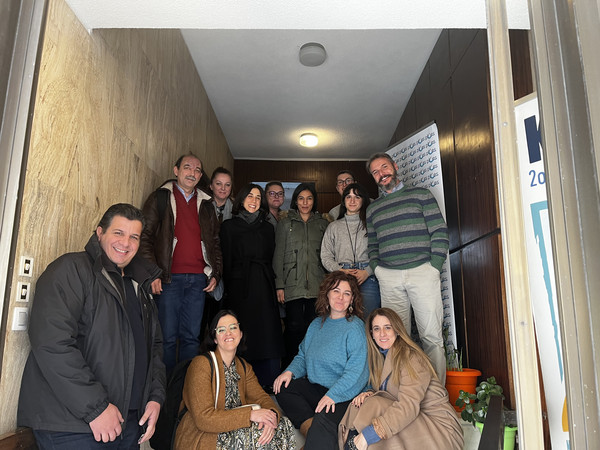New Green Enough project to promote the adoption of ecological practices by adults and adolescents with disabilities

Between 1st-2nd February the partners of the Green Enough Project met for the first time in Piraeus, Greece. The project aims to empower adults and adolescents with developmental and/or intellectual disabilities to adopt more sustainable practices with the support of an innovative augmented reality app.
Why be Green Enough?
According to scientific analysis led by NASA, the average global temperature on Earth has increased by at least 1.1° Celsius since 1880. Much of this increase has occurred since 1975, at a rate of roughly 0.15 to 0.20°C per decade. This rapid rise has been largely attributed to the impacts of human activities, including the use of aerosols, and burning of fossil fuels, which contribute to the accumulation of greenhouse gasses.
The rising average global temperatures has ongoing consequences, including sea-level rises and extreme weather conditions, such as drought, flooding and heatwaves. According to the World Meteorological Organisation, these changes to global and local climate have affected millions of people and cost billions in 2022 alone.
The World Institute on Disability estimates that 10-15% of the global population has a disability. Persons with disabilities are not only more vulnerable to the negative impacts of climate change but are also more likely to be excluded from conversations and actions to protect and promote rights to a clean and healthy environment.
What will the Green Enough project achieve?
In response to the need for increased, socially inclusive action on climate change, the Green Enough project has been launched. The project aims to promote the inclusion of people with developmental and/or intellectual disabilities (D.D./I.D) in climate change conversations as well as empower them to make their own decisions to implement sustainable practices.
To do this the project will:
- Develop and implement a set of training materials for professionals working with people with D.D./I.D that will enable professionals to educate people with D.D./I.D on environmental topics.
- Create an Augmented Reality Application that will help beneficiaries to understand basic principles around recycling.
- Publish an easy-to-read guide on using the Augmented Reality Application.
- Raise awareness for climate change and the need for ecological behaviour for individuals with D.D./I.D. and their caregivers.
What is the benefit of Green Enough?
The 24-month project will directly benefit professionals working with people with disabilities, including psychologists, social workers, occupational therapists, special educators. These professionals will be the target of the Gren Enough training and will be able to use the project materials to empower the adults they work with to have a better understanding of sustainable practices and how they can start implementing them.
The project will also benefit adults with D.D./I.D. who will be empowered to make their own decisions about the environment and sustainable practices.
Green Enough launch in Greece
Bringing together partners from Belgium, Cyprus, Greece, Poland and Portugal, the project launched in January 2023. The project partners met between1-2nd February in Piraeus, Greece to discuss the first developments of the project’s Augmented Reality app, that will help to educate adults with D.D./I.D on the basic principles of recycling as well as the foundations for the Green Enough training course.
Following the meeting partners will conduct desk researchon ecological behaviour and disability and to identify existing tools and methodologies.
To find out more about the Green Enough project, click here.
Note for editors:
The Educational program to raise ecological behaviour through an inclusive methodology using Augmented Reality Technology (Green Enough) is an Erasmus+ project supported via the Greek National Agency (Project No: KA220-ADU-FD4DE223). The project partnership includes the project coodinator Astiki Etaireia Psichokoinonik on Meleton (Ploes) (Greece) and the following parnters Associacao Para a Recuperacao de Cidadaos Inadaptados da Lousa (ARCIL)(Portugal); Fundacja Eudajmonia (Poland); Kypriaki Etaireia Pistopoiisis Limited (Cyprus); Anaptyxi Kainotomikon Olokliromenon Proionton Asyrmaton Diktyon Aisthitiron Etaireia Periorismenis Euthynis (Sensworks) (Greece); Akti Kentro Meleton Ke Erevnas (AKTI) (Cyprus); European Association of Service providers for Persons with Disabilities (Belgium).

